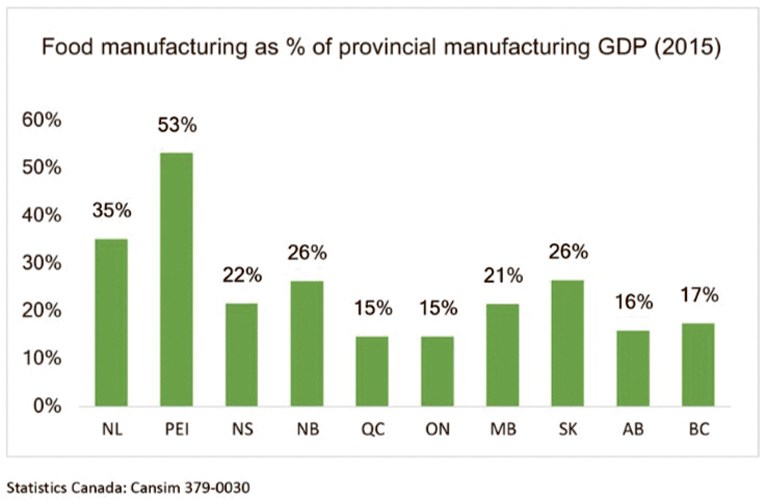Canada’s food and beverage exports have nearly doubled over the past decade and the sector continues to stand out from the rest of the country’s manufacturing industry, according to J.P. Gervais, chief agricultural economist for Farm Credit Canada (FCC).
Canada’s food and beverage manufacturing sector – which includes activities, such as meat and dairy processing, grain and oilseed milling, and fruit and vegetable preserving – has been growing at an average of 3.2 per cent over the past three years, a full two per cent stronger than Canada’s overall manufacturing sector (average 1.2 per cent) over the same period.
“The performance of this sector speaks to its resilience, as well as its ability to innovate and adapt to the changing consumer markets,” Gervais said. “Food is a global industry and Canada’s reputation as a consistent producer of high-quality, safe agriculture commodities and manufactured food products plays a significant role in our success.”
In Canada, the sector produced goods valued at over $114 billion in 2016, accounting for 18.5 per cent of all manufacturing shipments, close to two per cent of the national gross domestic product (GDP) and 250,000 jobs nation-wide, many in rural and agricultural areas.
“The benefits of the food and beverage processing industry are spread across the country and throughout the food supply chain, contributing significantly to every provincial economy,” said David Shambrock, chair of the Canadian Food Innovators. “Our processors have a close relationship with their suppliers – Canadian farmers – who are among the most productive and efficient in the world.”
This close supply chain relationship allows food and beverage processors to innovate and quickly adapt to new market trends, positioning Canadian agriculture as a leading global producer and exporter of agriculture commodities and value-added food products, according to Shambrock.
Canada exports food products to more than 180 countries, and although 74 per cent of Canadian exports are destined for the U.S. market, opportunities in other markets, like China, are growing.
“The climate for investment in Canadian food processing is positive, given the weak Canadian dollar, low interest rates and growing demand in the U.S.,” Gervais said. He projects exports of food manufactured products to the U.S. could increase by up to five per cent in 2017.
Gervais said food processors have benefitted from a low Canadian dollar, which is partly the reason behind the strong growth in the GDP of the sector over the past few years. A low dollar makes Canadian food products less expensive for foreign buyers, while making it more difficult for foreign food processors to compete in the Canadian market.
Beyond favourable economic conditions, product innovations have made Canadian food processors leaders in many food categories, Gervais added.
Through its Young Entrepreneur Loan, FCC is helping the next generation become established in the food and beverage processing sector, as well as the agriculture manufacturing and retail sectors. It offers financing of up to $1 million per qualified applicant, under age 40, and can be used for the purchase or improvement of agriculture-related assets or the purchase of shares in an agriculture-related business, including those in the agri-food sector.
For an in-depth look at Canada food and beverage processing sector, visit the FCC Ag Economics blog post at www.fcc.ca/AgEconomics.
FCC is Canada’s leading agriculture lender, with a healthy loan portfolio of more than $30 billion. Our employees are dedicated to the future of Canadian agriculture and its role in feeding an ever-growing world. We provide flexible, competitively priced financing, management software, information and knowledge specifically designed for the agriculture and agri-food industry. Our profits are reinvested back into agriculture and the communities where our customers and employees live and work. Visit fcc.ca or follow us on Facebook, LinkedIn, and on Twitter @FCCagriculture.




